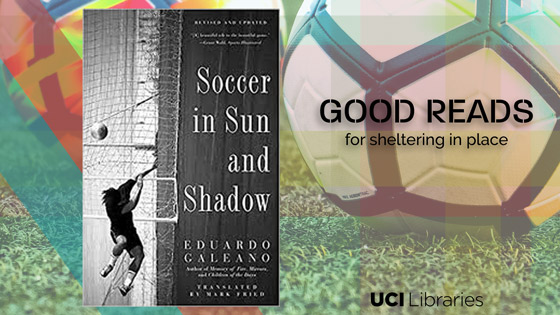
The Human Affairs as Written in the History of Soccer
This week for Good Reads for Sheltering in Place, Richard M. Cho recommends one of the best sports books as the German soccer league, Bundesliga, begins to live stream games without audiences.
Soccer in Sun and Shadow by Eduardo Galeano
As the title suggests, the book narrates, using perfect metaphors and magical-realist descriptions, both the heavenly euphoria that is soccer and inevitable commercialization of it that has ushered in shadows in an otherwise sun-filled stadium. Galeano tells of how soccer in Latin America was in the beginning a colonial import from Europe, of scathing racism that is a persistent thorn in the green playing field, and of those impossible success stories of downtrodden children whose only toy was a soccer ball. Did you know that Albert Camus was the goalkeeper for the University of Algiers soccer team? He chose the position because he was poor and "in that position your shoes don't wear out as fast." There is much to admire in this book, but Eduardo's genius shines brightest when he juxtaposes momentous historical events to each year of the FIFA World Cup, which first began in 1930, when Uruguay was the very first unlikely champion. In the 1938 World Cup, "Germany's side incorporated five players from recently annexed Austria. Thus reinforced, with swastikas on their chests and all the Nazi symbols of power at hand...," and in the final round which was Italy against Hungry, "For Mussolini, winning was a matter of state. On the eve of the match, the Italian players received a three-word telegram from Rome, signed by the Fascist leader: Win or die. They did not have to die because Italy won 4-2." Just like how Marx saw religion, soccer can be the opiate of the people: Worshipping, fanatical devotion, and salvation all aptly describe what soccer entails. Yet, its magic is none like others, so Galeano infers, and the game will continue as long as we inhabit this planet.
UCI Library Link
Richard M. Cho is research librarian for Humanities and Literature at UC Irvine and contributor to the Los Angeles Review of Books
